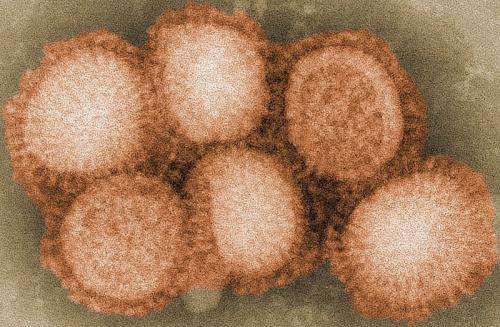
(Tom: Vaccines – not for this little black duck thank you!)
A new study in the U.S. has shown that pigs vaccinated against one strain of influenza were worse off if subsequently infected by a related strain of the virus.
Microbiologist Dr. Hana Golding of the Center for Biologics Evaluation and Research at Bethesda in Maryland and colleagues at the National Animal Disease Center in Ames, Iowa and elsewhere, vaccinated “naive” piglets (those that had never been exposed to flu viruses) against the H1N2 influenza strain and later exposed them to the rare H1N1 virus, which is the virus responsible for the 2009 swine flu pandemic.
When the piglets were vaccinated they produced a wide range of antibodies to block the H1N2 virus, but these “cross-reactive” antibodies not only failed to provide protection against the second virus, H1N1, but appeared to actually help the H1N1 virus infiltrate lung tissue and cause more severe symptoms and respiratory system complications such as pneumonia and lung damage. The unvaccinated controls suffered milder pneumonia and fewer other complications. This effect is called Vaccine-Associated Enhanced Respiratory Disease.
The researchers found that the antibodies produced in response to H1N2 could not bind to a key region of the H1N1 virus and could therefore neither kill nor neutralize them and stop them binding to cells in the pigs’ lungs, and in fact helped the new virus to fuse to lung cells and multiply more readily, through a process the scientists dubbed “fusion enhancing.”
The team concluded that this effect should be taken into consideration by researchers trying to develop a universal influenza vaccine to protect humans from all strains of flu virus, (see this article, for example) since protection against one strain may produce antibodies that assist similar, related strains of virus. They also cautioned that their results may not apply to humans, and that the vaccines they used were made from whole, killed viruses, unlike those used to protect humans, which are made from parts of killed viruses.
The current findings add weight to studies of the 2009 outbreak of H1N1 flu in Canada, which discovered that people who had received the normal seasonal flu vaccine were more likely to be affected by H1N1 than those who had not been vaccinated.
https://medicalxpress.com/news/2013-08-vaccination-flu-worse-exposed-strain.html
